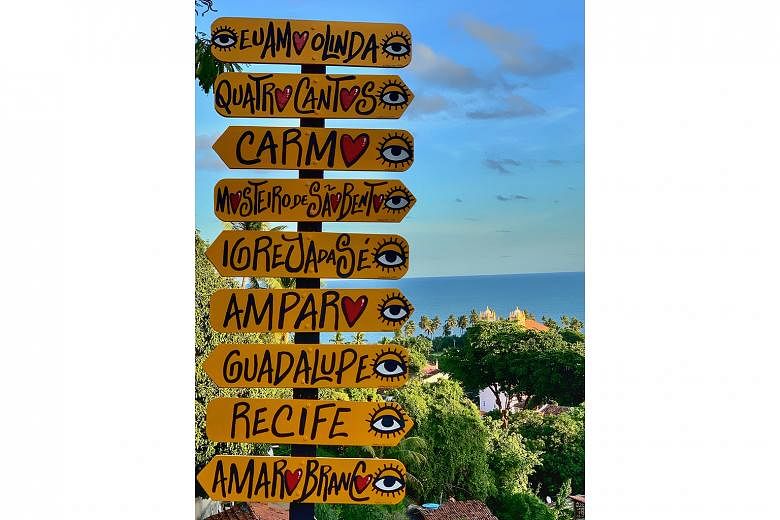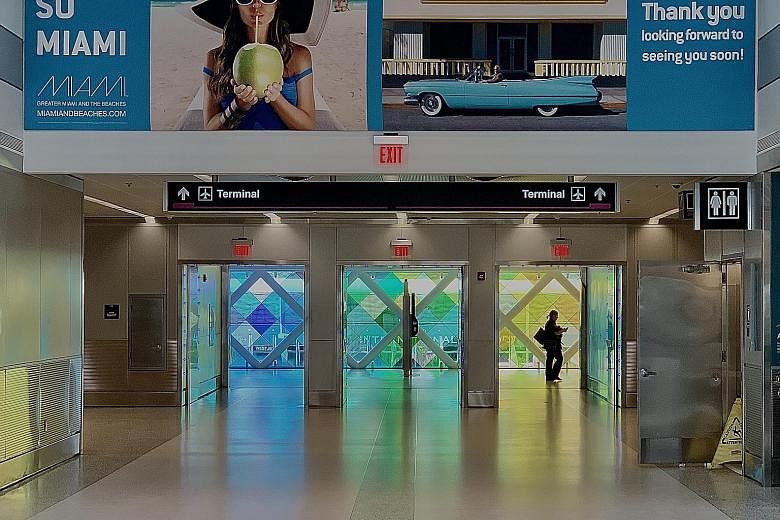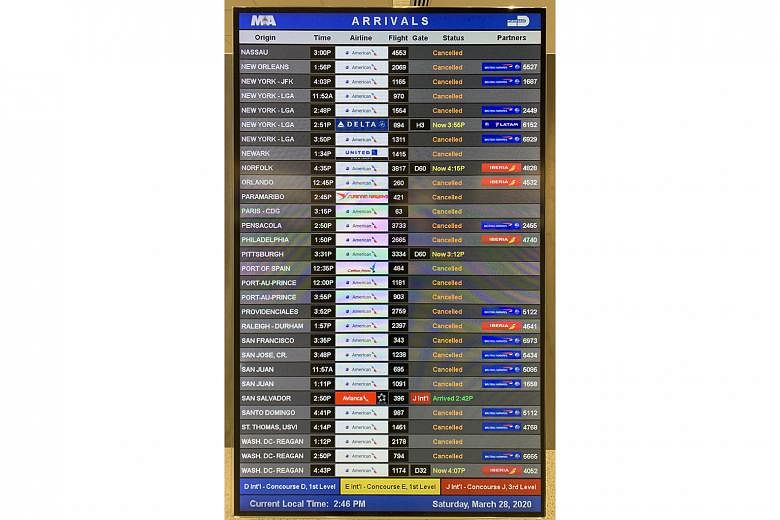My sore throat hurts. The dry cough keeps me awake at night. It is late February and my fifth day on a 22-day cruise to Antarctica. Updates of the coronavirus have been hogging headlines. Do I have the symptoms?
The next day, I see the ship's doctor. "Just an infection. You probably caught it from someone aboard," he assures me.
Fast-forward: I get off the ship in mid-March - to a world facing an unprecedented health pandemic.
Borders have tightened dramatically. Flights are cancelled. Masks become a daily accessory.
We are escorted by armed guards to the airport. The entire port city of Ushuaia in Argentina is locked down.
Present day: In mid-April, after 13,500km, I am back home. Along the way, I dodged closing borders; grappled with numerous flight cancellations; jousted with abrupt changes of travel plans; and drove rental cars cross-country instead of flying. All the while, I was trying to navigate the travel havoc created by Covid-19.
It is a harrowing travel tale best forgotten: getting out of Argentina a day before it locked down; forgoing a flight to Paraguay; cancelling a dive trip to Brazil's ecological marvel Fernando de Noronha; and shredding a Caribbean island-hopping plan as swathes of territories shut down in unison.
Here are some travel hacks - gleaned from the tripwires I avoided - for people who may still be trying to fly home or want to travel safer after the pandemic.
1 Book directly with the airline or hotel
Changes or cancellations can become a nightmare when the booking is done via a third-party platform.
The airline or hotel will redirect travellers to the booking agent. It will be a series of tense back-and-forth conversations.
When booked directly, however, answers and solutions are more forthcoming.
While third-party websites may offer free cancellation, I would not bet on a fast refund.
Recently, a fellow traveller bought refundable air tickets via a third-party website, but a month later, she has not seen her money. The booking agent claims to be waiting for the airline to approve the refund. Pro tip: For air travel, I use search engines to check on the best fare and availability. Thereafter, I zoom in on the airline's website to compare. If it provides a similar fare - or even slightly higher - I prefer to transact directly with the airline.
When a third-party website offers substantially lower fares, I may be enticed, but only after a reality check of its online reviews.
Some third-party websites use a "bait and hook" strategy of low pricing, but raise the fare during the booking process or slap on fees before payment. Others may confirm the booking, but send a subsequent e-mail stating a revised higher fare. You either top up or pray for a refund.
Worse, some do phantom bookings. It is heartstopping at the check-in counter when the staff cannot locate the booking.
To avoid such scenarios, always ensure the bookings are ticketed with the unique Iata (International Air Transport Association) set of 13 numbers.
Frequently seen confirmation codes - those linguistically challenging letters of the alphabet - may sometimes not connect between the third party and the airline.
When using third-party platforms, I find Trip.com competitive. It offers myriad fares, for instance, with or without luggage.
Fares may also be lower than what is available on the airline platforms. Last month, I clinched a special fare 30 per cent lower than what the Aerolineas Argentinas site offered.
2 Reserve a room for the first night
Venturing deep into off-the-beaten-track destinations, especially when staying in smaller owner-operated hotels, I may book the first night in the lowest category available - even if I have earmarked a longer stay in the area.
On a visit to the Honduras island of Roatan, I saw positive TripAdvisor reviews for a new hotel that was a 10-minute walk to the beach. It ticked all the right boxes, but a reviewer red-flagged the barking neighbourhood dog and the thumping music from a nearby gym. I booked just the first night.
Upon check in at such hotels, I will suss out the property and politely ask for an upgrade. I mention that I may extend beyond a one-night stay and ask for a more comfortable room, with a better view.
Oh, in Honduras, the wimpy guard dog yawned more than it barked. The gym closed by 9pm.
So I further negotiated for a lower rate for the subsequent nights, knowing that the hotel saved on the 20 to 25 per cent commission due to third-party platforms.
With minimum commitment, I can get flexibility, and possibly a better room, at a lower rate.
But if it is peak travel season, make a decision whether to stay longer or to move when you check in. You do not want to be bumped if the subsequent nights are sold out.
For international hotel chains, I book directly to earn my points and indulge in my membership benefits. Pro tip: Always be nice when you check in. The receptionists have the authority to change a preallocated room.
Crack a joke; share some prized chocolates from your last destination; or leave a tip if the dinner recommendation turns out par excellence - the receptionists are an invaluable local resource throughout the stay.
3 Cash is king, but debit cards are getting closer
Picture this: Swiping US$50,000 (S$70,800) an annum on overseas credit card transactions costs US$1,500 to US$2,000 more, compared to cash payments.
That easily buys four round-trip economy tickets between Singapore and Bangkok. And card swipes quickly add up with family groups.
Credit card payments in foreign currencies are subject to unfavourable exchange rates - compared with money changers.
Calculations reveal a 3 per cent gap between the cash forex rate and the credit card rate.
Exotic currency transactions are even more painful. The card issuer converts the local currency into US dollars and then further into Singapore dollars. It is a double whammy of commissions and fees.
The greenback remains the undisputed global travel currency, especially outside Europe. So it is the de facto currency to carry.
Recently, in Argentina, the streetside money changers dangled a rate of 77 pesos (S$1.70) to the US dollar. With the bank official rate at 63 pesos, that was a staggering difference of 22 per cent. And a credit card transaction would be even wider.
For every US$1,000 cash swap, I get an additional 14,000 pesos. That difference buys a two-night stay at the Holiday Inn. But do transact in a shop and not on the streets - and learn to spot fake bills.
If plastic is still preferred, there are pre-paid debit cards that offer multi-currency, competitive exchange rates. Moreover, such cards allow pre-loaded foreign currencies that may be withdrawn from overseas automated teller machines. Pro tip: YouTrip's Mastercard is highly competitive. The pre-paid debit card provides interbank wholesale exchange rates on foreign currencies, with zero fees.
I have been pleasantly surprised that some rates are even more competitive than money changers'.
As a super hack, use a Singapore credit card (which earns points for all transactions) to load up the YouTrip card..
4 At times, car rental trumps flying
With my aborted trips due to the coronavirus, I had time on my side, so I decided to do some cross-country driving in the US.
Car rental in the US is always competitive, but this time round, with the sharp drop in demand, the deals were almost unbelievable.
A one-week rental of a sport utility vehicle (SUV) cost US$120 or US$18 a day and came with unlimited mileage.
I picked up the car in Miami and dropped it off 1,500km away in Nashville without incurring any one-way fees.
The airfare for the same routing was US$200.
Car rental, especially if shared, beats flying and is a pleasant way to zip through country roads.
Flying is currently vulnerable to cancellations. And the plunging oil prices made it memorable - it cost only US$28 for a full tank. Pro tip: Forget booking directly with car-rental companies. Instead, comb through rentalcars.com or easyrentcars.com - they offer rentals at a fraction of the providers' price.
5 Check your pre-booked flights periodically
Given the massive flight cancellations, I checked my scheduled mid-April flight from Newark to Singapore. To my horror, all flights out of the US to the Republic on Singapore Airlines (SIA) were cancelled until end-May, except for one.
My scheduled flight, in an uncanny twist of fate, was still operating. But strangely, the SIA website did not allow new bookings for the flight. A red flag went up immediately. Fearful of being stranded in New York, a city where the Covid-19 infections were spreading fast, I quickly contacted SIA to ask for an earlier flight home.
The call centre responded that since my flight was still scheduled, it would not refund the restricted fare I had purchased. Neither did SIA offer alternative options such as a re-route with other operating airlines.
I had the choice of paying more for changes - for a re-route with other carriers - or staying another two weeks in the country. I decided not to do that. Thankfully, there was a happy ending - see Point 6. Pro tip: With flightstats.com, I monitor my flights for cancellations. Re-timings can also affect planned connecting flights. By doing so, I can swing into early remedial action.
6 Leave your contact details with MFA
Over the past five years, I have averaged 250 days outside Singapore annually. Thus, I felt it would be too cumbersome to continuously register with the Ministry of Foreign Affairs (MFA) Singapore. Until now.
With global borders fast closing, I quickly registered with MFA after my episode with SIA. At the same time, I e-mailed the Singapore Consul in New York about my predicament and desire to get home soonest.
Within two days, I was on the telephone with the consul, who highlighted a flight on SIA from Los Angeles to Singapore that weekend.
"There are some who are still in the US for work or school. But if you are just travelling for leisure, you should go home," she said emphatically.
It struck me as warm, helpful advice. Even for a seasoned traveller who has been to 150 countries, this disruption is uncharted waters.
Within hours, I dropped all other travel arrangements and flew from Miami to Los Angeles and caught the red-eye SIA flight to Singapore. I had to pay a hefty fare difference, but nothing beats getting home safely. Pro tip: Do register with MFA. It provides important updates.
Finally, do not forget to buy travel insurance. And please stay home for now.
• John Tan hopes for a new, healthier normal soon, with borders re-opened and safer travel. Meanwhile, he has planned a late summer trip to see the salmon run in Kamchatka, Russia, if travel restrictions ease.




